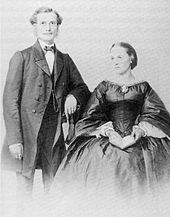Johannes Merkel (textile manufacturer)
Johannes Merkel (born April 19, 1798 in Ravensburg , † May 18, 1879 in Esslingen ) was a German textile manufacturer.
Life and work
Johannes Merkel came from an old Ravensburger merchant family. He lost his father at the age of one, which is why his stepfather Schöllkopf and his brother CG Schöllkopf in Esslingen am Neckar were decisive for his education . Merkel attended elementary school and secondary school in Ravensburg and Esslingen. He then completed training as a businessman from 1811. First with his uncle in Esslingen am Neckar, then in the Turkish yarn dyeing and chicory factory of Mylius and Co. in Stuttgart. At the last station of his training, with Samuel G. Liesching in Stuttgart, he then worked as a clerk for four years. In 1817 he returned to Ravensburg and worked in his stepfather's shop for twelve years.
Textile manufacturer
In 1830 Merkel took over a weaving and spinning mill under the name Merkel and Wolf in Esslingen, together with the cloth maker Conrad Wolf and Ludwig Kienlin , a businessman and a silent partner until 1844 . The manufacture was founded in 1823 under the company Keßler, Hübler & Cie. On behalf of and with the capital of the Banque Veuve Clicquot from Reims (France) by the Ludwigsburg-born businessman Christian Ludwig Hübler and the Heilbronn economist Heinrich Kessler, who was known beyond the national borders as a writer, member of the Württemberg state parliament and former employee of Friedrich List , was founded. Kessler was the older brother of Georg Christian (von) Kessler (1787–1842), who had lived in Reims (Champagne) since 1807 , and Hübler, who had been married to their sister Johanna Friederike Kessler since 1819, was part of the family. As a partner in the Reims champagne house, "Georges" Kessler has also managed the bank since 1821 and had already built two textile factories in France with its financial resources. In order to be able to maintain the operation of the manufactory, which was equipped with the most modern French machines and therefore heavily indebted, Kessler sold his shares in the Reims companies on May 24, 1826 and took over the Esslingen textile factory as sole owner, but published it in the supplement of the Swabian Merkur dated July 13, 1826 an offer for “stock lovers” to participate in the capital stock of the manufacturing company. On July 1, 1826, he founded the sparkling wine cellar GC Kessler & Cie and therefore leased parts of the textile factory to his operations manager Conrad Wolf, who, after Johannes Merkel and Ludwig Kienlin joined the company, developed into one of the largest commercial enterprises in Württemberg.
In May 1826 King Wilhelm I of Württemberg visited what was then the most modern factory for machine-spun worsted and woolen yarns and benevolently noted "the vigorous endeavors to perfect and revitalize this branch of the patriotic industry".
At first, cloth, blankets, woolen fabrics and knitting yarn were produced in rented rooms. Merkel was the driving force in the company. When Wuerttemberg joined the German Customs Union and faced overwhelming competition from Prussia and Saxony , he changed the corporate strategy and gave up the unprofitable weaving mill. He concentrated the company entirely on the production of knitting and worsted yarn. The rise of the company began with this product, which became world-famous under the name Esslinger wool .
Merkel always acted according to the motto of reinvesting profits in the company, for example in new technologies. In 1842 he was able to put a steam engine into operation, the second steam engine in Württemberg. In 1856 he introduced gas lighting in the factory. In 1869 he withdrew from the company and handed the management over to his son Oskar Merkel . Under the descendants of Merkel and Ludwig Kienlin, the company, which has been known as the worsted spinning mill Merkel and Kienlin since 1890, achieved a leading position in Germany. In connection with the decline of the textile industry in Germany, the end of this company had come. In 1973 it was liquidated in the fourth generation of entrepreneurs. The trademark rights were already taken over in 1971 by Schoeller Eitorf AG .
family
Johannes Merkel was the son of the businessman Christoph Clemens Merkel (1762–1799) and Regina Barbara Merkel born. Merk (1765-1825). After the death of his father, his mother married the merchant Christian Friedrich Schöllkopf in 1800. Johannes Merkel married Louise Schott in Stuttgart in 1834. The couple had two sons and five daughters. One of the sons was Oskar Merkel (1836–1912), who, after his father, took over and managed the company in 1869. Oskar Merkel's son Eugen Merkel (1862–1929) took over the company in 1912 in the third generation.
Honor
Johannes Merkel was honored with the Knight's Cross of the Order of Frederick in 1856 .
literature
- Anneliese Hermann: Merkel, Johannes. In: New German Biography (NDB). Volume 17, Duncker & Humblot, Berlin 1994, ISBN 3-428-00198-2 , p. 152 f. ( Digitized version ).
- G. von Klass: The wool spindle , A Swabian family portrait, 1955.
Individual evidence
- ↑ Swabian Mercury . In: Christian Gottfried Elben (Ed.): Supplement . No. 166 . Stuttgart July 13, 1826.
- ↑ Rulf Neigenfind: The Double Life of George Christian Kessler . 2nd Edition. Lane Books, Paris 2012, ISBN 978-2-9535498-2-9 .
| personal data | |
|---|---|
| SURNAME | Merkel, Johannes |
| BRIEF DESCRIPTION | German industrialist |
| DATE OF BIRTH | April 19, 1798 |
| PLACE OF BIRTH | Ravensburg |
| DATE OF DEATH | May 18, 1879 |
| Place of death | Esslingen |
